Creating a language one day at a time! A YouTube Series with hosts Jessie Sams and David Peterson.
Don't wanna be here? Send us removal request.
Text

The final Okoki word for this year’s Lexember is “ẽtu” (“to gather, to collect”), from *insu. This form is affected by three sound changes: high vowels lower before a nasal coda (*insu > *ensu), fricatives fortify to stops after a nasal (*ensu > *entu), and nasal codas drop out, leaving behind a nasal vowel (*entu > ẽtu).
“Ko odapo’ina ẽtudonu.” (“The squirrel gathered treasures.”)
Happy end of Lexember and New Year’s Eve!
31 notes
·
View notes
Text
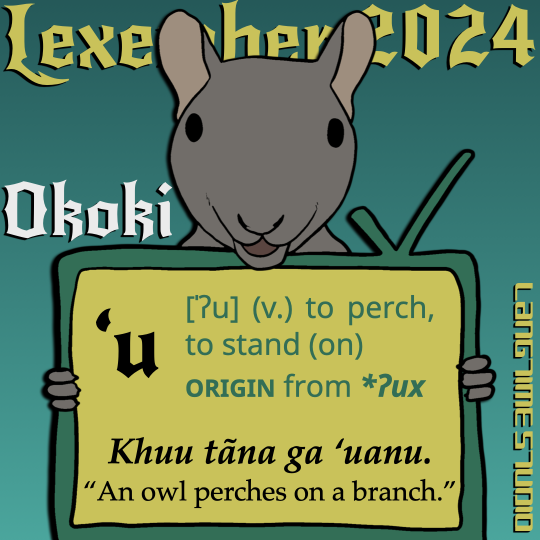
The Okoki word for Lexember 30 is “‘u” [ʔu] (“to perch, to stand”), from *ʔux. It occurs with the non-past and third-person singular suffixes in the sentence “Khuu tãna ga ‘uanu” (“An owl perches on a branch”).
8 notes
·
View notes
Text

Today’s Okoki Lexember word is “tã” (“branch”), which comes from *tam. An example sentence is “Khuu tãna ga ‘uanu” (“An owl perches on a branch”).
3 notes
·
View notes
Text

The Okoki word for Lexember 28 is “khuu” (“owl”), which is very much an onomatopoeic word.
“Khuu tãna ga ‘uanu” means “An owl perches on a branch.”
4 notes
·
View notes
Text
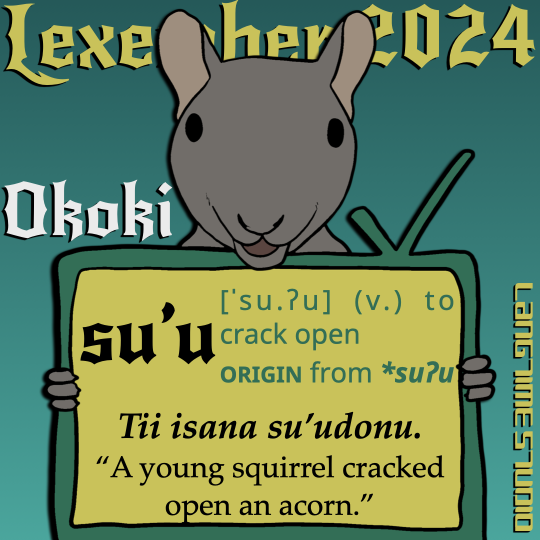
The Okoki word for Lexember 27 is the verb “su’u” (“to crack open”), as in the sentence “Tii isana su’udonu” (“A young squirrel cracked open an acorn”).
5 notes
·
View notes
Text

Today’s Okoki Lexember word is “isa” (“acorn”), from *iksa. In the sentence “Tii isana su’udonu” (“A young squirrel cracked open an acorn”), “isa” occurs with the suffix “-na,” marking it as an object.
4 notes
·
View notes
Text
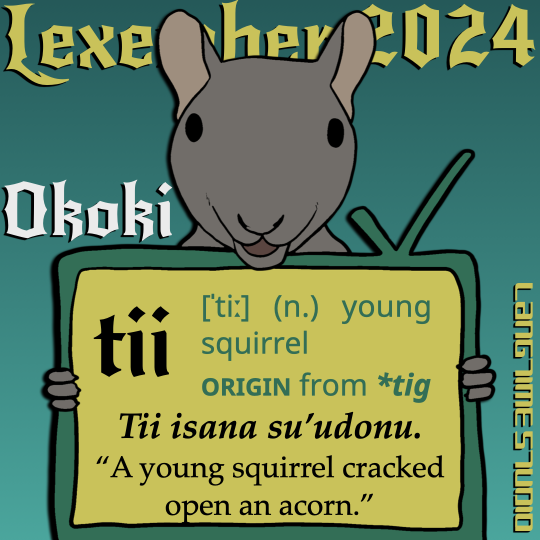
The Okoki word for Lexember 25 is “tii” (“young squirrel”), which comes from *tig. When non-nasal voiced codas were deleted, the vowel was compensatorily lengthened.
“Tii isana su’udonu” means “A young squirrel cracked open an acorn.”
8 notes
·
View notes
Text

The Okoki word for Lexember 24 is “mahu” (“to dig”), as in the sentence “Osanu mahuara” (“The animals are digging”). This particular sentence was my favorite to say from all the sentences for this month. It rolls off the tongue quite nicely!
4 notes
·
View notes
Text
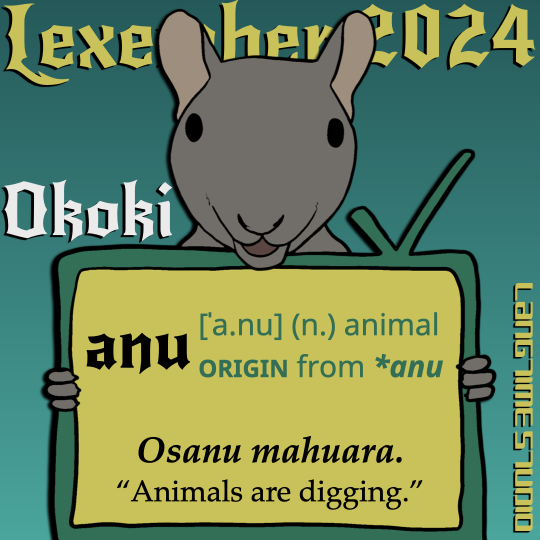
Today’s Okoki Lexember word is “anu” (“animal”), which is the source for the third-person singular nominative pronoun “nu” and also the 3sg subject-agreement suffix that occurs with verbs (“-(a)nu”).
“Osanu mahuara” means “Animals are digging.”
14 notes
·
View notes
Text

The Okoki word for Lexember 22 is “ãpa” (“to grab”), which comes from the proto-form *amsa. Fricatives assimilated after nasal consonants and then fortified to a stop, so *amsa > *amfa > *ampa, and then the nasal coda was lost, resulting in “ãpa.”
“Oraba lõna ãpadora” means “The hawks grabbed moss.”
4 notes
·
View notes
Text
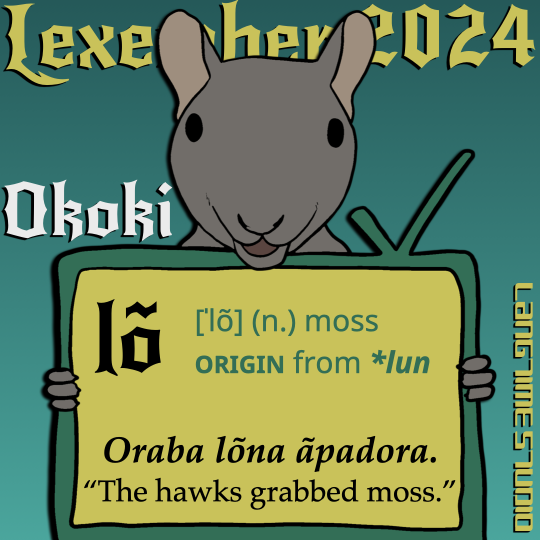
Today’s Okoki Lexember word is “lõ” (“moss”), which comes from the proto-form *lun.
“Oraba lõna ãpadora” means “The hawks grabbed moss.”
6 notes
·
View notes
Text

The Okoki word for Lexember 20 is “raba” (“hawk”), as in the sentence “Oraba lõna ãpadora” (“The hawks grabbed moss”).
You can watch little videos of these entries in this playlist: https://youtu.be/WLHKa4vbTYE?si=18iGmbVfAo-WwA3L
19 notes
·
View notes
Text

Today’s Okoki Lexember word is “dogi” (“to hide”), which completes the sentence “Lia arẽna ga dogidonu” (“A deer hid in the bush”).
8 notes
·
View notes
Text
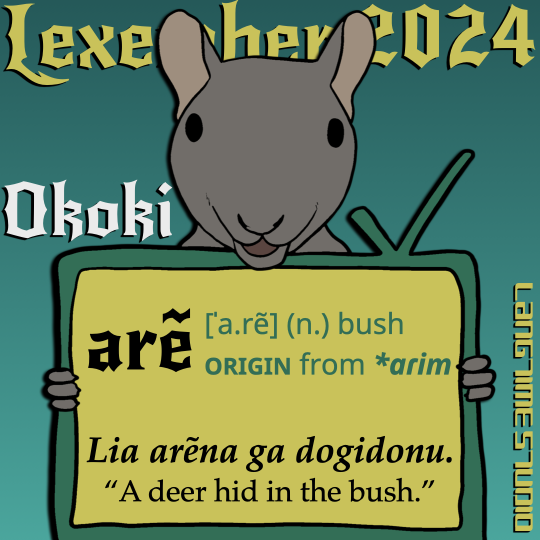
The Okoki word for Lexember 18 is “arẽ” (“bush”), which comes from the proto-form *aɾim. In the sentence “Lia arẽna ga dogidonu” (“A deer hid in the bush”), “arẽ” is in its accusative form, functioning as the object of the postposition “ga”.
12 notes
·
View notes
Text
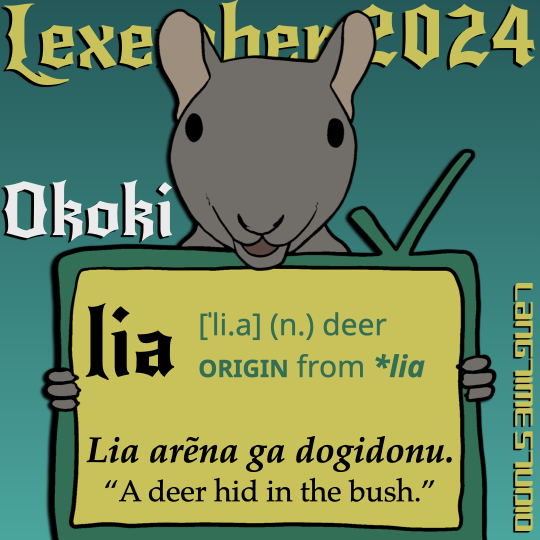
Today’s Okoki Lexember word is “lia” (“deer”), as in the sentence “Lia arẽna ga dogidonu” (“A deer hid in the bush”).
20 notes
·
View notes
Text

The Okoki word for Lexember 16 is “khara,” which is the third-person plural form of the copular verb indicating a temporary state, coming from the verb *ʔux “to stand.” This verb completes the sentence “O’i bẽtuna ga khara” (“The babies are in the nest”).
4 notes
·
View notes
Text

Today’s Okoki Lexember word is “ga,” which is a general locative postposition. It can be translated as “on, in, near, at,” depending on the context. “O’i bẽtuna ga khara” is best translated as “The babies slept in the nest” because it would be odd for babies to be sleeping near a drey nest (in a tree, without protection of a nest). This postposition ultimately comes from the verb *gala “to touch.”
5 notes
·
View notes